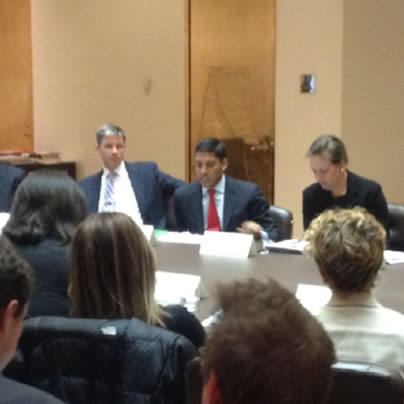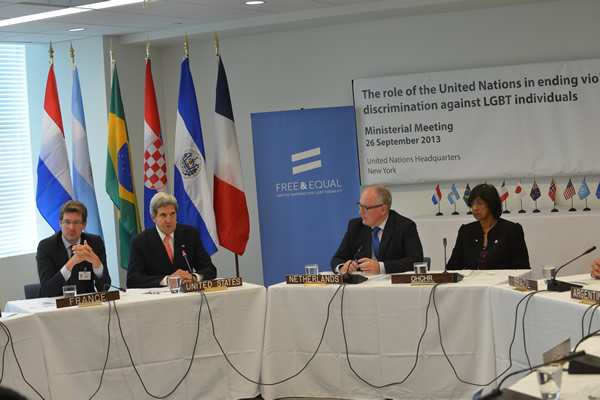News
LGBT issues discussed at first-of-its-kind U.N. meeting
Funders of global gay initiatives met in NYC, Kerry signs onto declaration


USAID Administrator Rajiv Shah is among those who attended a meeting of global LGBT funders on September 24 during the U.N. General Assembly in New York. (Photo courtesy of USAID.)
USAID, the Swedish International Development Corporation Agency (SIDA,) the Astraea Lesbian Foundation for Justice and the Ford Foundation on Tuesday hosted a meeting of funders of global LGBT advocacy efforts.
USAID Administrator Rajiv Shah, SIDA Director General Charlotte Petri Gornitzka and former Planet Out CEO Megan Smith, who is now vice president of Google[x], attended the gathering alongside high level officials from Austria, Denmark, Finland, Norway, Swedish, the United Kingdom, the U.N. Development Program, the State Department and the World Bank.
Representatives from the American Jewish World Service, the Arcus Foundation, the Fund for Global Rights, the Gay & Lesbian Victory Institute, the Dutch foundation Mama Cash, the National Gay and Lesbian Chamber of Commerce, the Open Society Foundation and the Swedish Federation for Lesbian, Gay, Bisexual and Transgender Rights are among the other groups that took part in the meeting. Organizers said it drew 85 percent of groups around that contribute to global LGBT efforts.
“It was a seminal moment in history because it is the first global meeting where public and private donors for LGBT equality came together to discuss priorities, programs and potential collaboration for ways forward,” senior USAID advisor Claire Lucas told the Washington Blade on Friday.
USAID in April announced the LGBT Global Development Partnership with the Gay & Lesbian Victory Institute, (SIDA) and other groups will contribute $11 million over the next four years to advocacy groups in Honduras and other developing countries. The initiative’s first two trainings took place in the Colombian cities of Cartagena and Bogotá late last month and in the spring respectively.
Denis Dison of the Gay and Lesbian Victory Institute added his organization remains “proud” to “partner in this work” with USAID and Astraea as he discussed Tuesday’s meeting with the Blade.
“This meeting was an important step in recognizing the truly global effort to advance LGBT human rights, and the leadership role now being played by the U.S. is a remarkable turnaround from just a few years ago,” he said.
Funders of global LGBT initiatives met in New York two days before Secretary of State John Kerry and representatives from 10 countries issued a declaration that calls for an end to anti-LGBT violence and discrimination.
Members of the LGBT Core Group at U.N. that includes the European Union High Representative for Foreign Affairs and Security Policy Catherine Ashton and ministers from Argentina, Brazil, Croatia, El Salvador, France, Israel, Japan, the Netherlands, New Zealand and Norway declared their “strong and determined commitment to eliminating violence and discrimination against individuals based on their sexual orientation and gender identity.”
“We reaffirm our conviction that human rights are the birthright of every human being,” the statement reads. “Those who are lesbian, gay, bisexual and transgender (LGBT) must enjoy the same human rights as everyone else.”
Acting Assistant Secretary of State for the Bureau of International Affairs Dean Pittman told the Blade during an interview from New York on Friday the meeting and the declaration underscores the U.N. and the U.S. are committed to “pursuing and advancing LGBT rights around the world.”
“Everybody’s reinforced the idea that everyone deserves human rights,” Pittman said. “It shouldn’t be a decision of who you are, who you love, what your gender is.”
Pittman further categorized the statement as “really strong, powerful.”
“This really has a ripple effect that sort of goes out through LGBT communities around the world who see this as sort of a vote of confidence,” he told the Blade. “[It] sort of gives them the ability to go into their own communities with the backing of a global organization like the U.N. to pursue some of these human rights issues in their own countries.”
The meeting took place two months after the U.N. officially launched a public campaign that seeks to increase support for LGBT rights around the world. It’s been endorsed by singer Ricky Martin and others.
More than 70 countries around the world continue to criminalize consensual same-sex sexual acts in spite of a 2011 resolution in support of LGBT rights the U.N. Human Rights Council passed. Gambian President Yahya Jammeh on Friday said in his speech during the U.N. General Assembly that homosexuality is among the three “biggest threats to human existence” as the Associated Press reported.
85 countries have also backed a U.N. General Assembly declaration in support of LGBT rights.
President Obama earlier this month met with two Russian LGBT rights advocates during the G-20 summit. Both he and Kerry have also criticized Russian President Vladimir Putin over his country’s LGBT rights record, which includes a law that bans gay propaganda to minors.
Pittman declined to say whether Kerry discussed Russia’s LGBT rights record during his meeting with Russian Foreign Minister Sergei Lavrov on Thursday during the U.N. General Assembly. He said Jessica Stern, executive director of the International Gay and Lesbian Human Rights Commission, briefed Kerry and other ministers on the country’s gay propaganda law before they issued their declaration.
“This is an issue we’ve raised with the Russians at many levels and repeatedly,” Pittman told the Blade. “It’s obviously unacceptable.
Council for Global Equality Chair Mark Bromley welcomed the meeting and the resolution.
“One would expect Syria and Iran to be on the agenda, but not necessarily human rights for LGBT people,” he told the Blade, referring to the U.N. General Assembly. “For a group of committed foreign ministers to come together during this time, including Sec. Kerry, to pledge collective action to respond to human rights abuses directed at LGBT communities worldwide is unprecedented.”
Chris Johnson contributed to this article.

Texas state Rep. James Talarico won a hard-fought primary Tuesday to become the state’s Democratic nominee for U.S. Senate, defeating U.S. Rep. Jasmine Crockett in one of the year’s most closely watched and competitive Democratic contests.
Talarico, a Presbyterian seminarian and three-term lawmaker from Round Rock, was declared the winner by the Associated Press early Wednesday morning after a closely tracked vote count that drew national attention.
“Tonight, the people of our state gave this country a little bit of hope,” Talarico told the AP. “And a little bit of hope is a dangerous thing.”
With 52.8% of the vote to Crockett’s 45.9%, Talarico secured the nomination outright, avoiding a runoff and capping months of sharp contrasts between the two candidates over strategy, messaging, and how best to compete statewide in Texas. Democrats hope the competitive primary — and the relatively narrow margin — signals growing momentum in a state that has not elected a Democrat to the U.S. Senate since 1988.
Talarico has long expressed support for the LGBTQ community, a position he highlights prominently on his campaign website. Under the “Issues” section, he directly addresses assumptions that might arise from his faith and background as a seminarian in a deeply conservative state.
“My faith in Jesus leads me to reject Christian Nationalism and commit myself to the project of democracy,” his website reads. “Because that’s the promise of America: a democracy where every person and every family — regardless of religion, race, gender, sexual orientation, or any other difference between us — can truly be free and live up to their full potential.”
Crockett struck a conciliatory tone following her defeat, emphasizing party unity ahead of November.
“This morning I called James and congratulated him on becoming the Senate nominee,” Crockett told Politico. “Texas is primed to turn blue and we must remain united because this is bigger than any one person. This is about the future of all 30 million Texans and getting America back on track.”
Talarico also drew national attention earlier in the race when “Late Show” host Stephen Colbert said he was initially unable to air an interview with the state legislator due to potential FCC concerns involving CBS. The episode sparked a broader political debate.
Brendan Carr, chair of the Federal Communications Commission, appointed by President Donald Trump, told reporters the controversy was a “hoax,” though he also acknowledged Talarico’s ability to harness the moment to build support as an underdog candidate. The interview was later released online and garnered millions of views, boosting Talarico’s national profile.
In November, Talarico will face the winner of the Republican primary between incumbent Sen. John Cornyn and Texas Attorney General Ken Paxton, who have been locked in a bruising GOP contest. Rep. Wesley Hunt was also in the Republican primary field. The GOP race is expected to head to a May runoff.
In a joint statement, Senate Minority Leader Chuck Schumer and Democratic Senatorial Campaign Committee Chair Kirsten Gillibrand praised Talarico’s victory and framed him as a candidate capable of broad appeal.
“As an eighth-generation Texan, former middle school teacher, and Presbyterian seminarian, James will be a fighter for Texans from all walks of life and of all political stripes,” they said. “In November, Texans will elect a champion for working people: James Talarico.”
Maryland
Md. Commission on LGBTQIA+ Affairs released updated student recommendations
LGBTQ students report higher rates of bullying, suicide

The Maryland Commission on LGBTQIA+ Affairs has released updated recommendations on how the state’s schools can support LGBTQ students.
The updated 16-page document outlines eight “actionable recommendations” for Maryland schools, supplemented with data and links to additional resources. The recommendations are:
- Developing and passing a uniform statewide and comprehensive policy aimed at protecting “transgender, nonbinary, and gender expansive students” against discrimination. The recommendation lists minimum requirements for the policy to address: name, pronoun usage, and restroom access.
- Requiring all educators to receive training about the specific needs of LGBTQ students, by trained facilitators. The training’s “core competencies” include instruction on terminology, data, and support for students.
- Implementing LGBTQ-inclusive curricula and preventing book bans. The report highlights a “comprehensive sexual education curriculum” as specifically important in the overall education curriculum. It also states the curriculum will “provide all students with life-saving information about how to protect themselves and others in sexual and romantic situations.”
- Establishing Gender Sexuality Alliances “at all schools and in all grade levels.” This recommendation includes measures on how to adequately establish effective GSAs, such as campaign advertising, and official state resources that outline how to establish and maintain a GSA.
- Providing resources to students’ family members and supporters. This recommendation proposes partnering with local education agencies to provide “culturally responsive, LGBTQIA+ affirming family engagement initiatives.”
- Collecting statewide data on LGBTQ youth. The data on Maryland’s LGBTQ youth population is sparse and non-exhaustive, and this recommendation seeks to collect information to inform policy and programming across the state for LGBTQ youth.
- Hiring a full-time team at the Maryland Department of Education that focuses on LGBTQ student achievement. These employees would have specific duties that include “advising on local and state, and federal policy” as well as developing the LGBTQ curriculum, and organizing the data and family resources.
- Promoting and ensuring awareness of the 2024 guidelines to support LGBTQ students.
The commission has 21 members, with elections every year, and open volunteer positions. It was created in 2021 and amended in 2023 to add more members.
The Governor’s Office of Communication says the commission’s goal is “to serve LGBTQIA+ Marylanders by galvanizing community voices, researching and addressing challenges, and advocating for policies to advance equity and inclusion.”
The commission is tasked with coming up with yearly recommendations. This year’s aim “to ensure that every child can learn in a safe, inclusive, and supportive environment.”
The Human Rights Campaign’s most recent report on LGBTQ youth revealed that 46.1 percent of LGBTQ youth felt unsafe in some school settings. Those numbers are higher for transgender students, with 54.9 percent of them saying they feel unsafe in school.
Maryland’s High School Youth Risk Behavior Survey reveals a disparity in mental health issues and concerns among students who identify as LGBTQ, compared to those who are heterosexual. LGBTQ students report higher rates of bullying, feelings of hopelessness, and suicidal thoughts. Nearly 36 percent of LGBTQ students report they have a suicide plan, and 26.7 percent of respondents say they have attempted to die by suicide.
The commission’s recommendations seek to combat the mental health crisis among the state’s LGBTQ students. They are also a call for local and state governments to work towards implementing them.
Virginia
Va. lawmakers consider partial restoration of Ryan White funds
State Department of Health in 2025 cut $20 million from Part B program

The Virginia General Assembly is considering the partial restoration of HIV funding that the state’s Department of Health cut last year.
The Department of Health in 2025 cut $20 million — or 67 percent of total funding — from the Ryan White Part B program.
The funding cuts started with the Trump-Vance administration passing budget cuts to federal HIV screening and protection programs. Rebate issues between the Virginia Department of Health and the company that provides HIV medications began.
Advocates say the funding cuts have disproportionately impacted lower-income people.
The Ryan White HIV/AIDS Program, a federal program started in 1990, provides medical services, public education, and essential services. Part B offers 21 services, seven of which remained funded after the budget cuts.
Equality Virginia notes “in 2025, a 67 percent reduction severely destabilized HIV services across the commonwealth.”
Virginia lawmakers have approved two bills — House Bill 30 and Senate Bill 30 — that would partially restore the funding. The Ryan White cuts remain a concern among community members.
Both chambers of the General Assembly must review their proposed changes before lawmakers can adopt the bills.
“While these amendments aren’t a full restoration of what community-based organizations lost, this marks a critical step toward stabilizing care for thousands of Virginians living with HIV,” said Equality Virginia Executive Director Narissa Rahaman. “Equality Virginia plans to continue their contact with lawmakers and delegates through the conference and up until the passing of the budget.”
“We appreciate lawmakers from both sides of the aisle who recognized the urgency of this moment and will work to ensure funding remains in the final version signed by the governor,” added Rahaman.


















